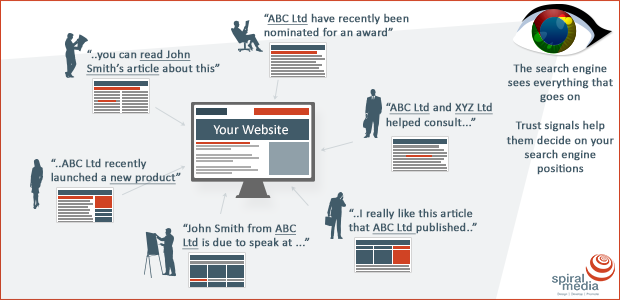During 2013, Google continued to make strong steps in the fight against spam and taking shortcuts with content in order to maintain their commitment to delivering the best results.
They’re continually becoming more in tune with the type of information the reader wants, as well as what they expect from websites.
Moving forward, business websites (whether brochure or e-commerce style) must be aware of the changes and thus adequately serve the need of the end-user and the search engine.
The constant fight against spam
Google’s Penguin and Panda developments continue to broaden the search engine’s definition of what constitutes as ‘spam’. They look deeper and more critically at your content as well as the quality and natural behaviour of links coming into pages.
The Hummingbird update was, in part, Google’s response to the increasing shift towards mobile and tablet use. Google now has better recognition and understanding of conversational search types (e.g. voice activated) so they can provide a more accurate set of results.
To do:
- Are you including all the detail necessary within your content, or are you holding back to a specific word count or lack of time?
- Content is crucial to your online success; so you be creative with much more insightful and engaging information.
Stop getting caught up on rankings for keywords
Keywords and rankings can quite easily be a distraction from what really matters, the content. Focussing on short and popular keywords gets in the way of creating extremely insightful content and end-user driven pages.
In short, if you want to be positioned well for “[industry] in Lincoln” then make sure you have the best website in regards to content, usability and popularity.
To do:
- On a Monday, write down the 5 most common questions you get asked within your business and start writing; don’t hold back! Just make sure you regularly make reference to the question so it can be matched to the user driven searches.
- Use something like Google Analytics to get an understanding of user behaviour on how they navigate through your website. Once they have read your articles, are they subscribing to newsletters, going to your social accounts or making an enquiry?
So stop focussing on keywords, and start focussing on the user.
To help you get started, I’ve published an article about how to create a content strategy that you might find useful.
Make mobile users your priority
Since the introduction of the Hummingbird update, the need to service and take the mobile user into consideration has never been greater.
With features like Siri, users make searches using their voice. When people use their voice, their questions tend to be longer, detailed and more specific. This means that your content should cover all angles and should contain structured data.
From a usability point of view, mobile users want their information fast, make their purchases quickly and not have to pinch and zoom to read the text. If you’re not giving the users what they expect, they will go elsewhere.
With the mobile search market already extremely large and growing quickly, if your website isn’t friendly for the mobile user, then you are way behind what is happening now.
To do:
- If you haven’t already, make 2014 the year you address the usability for the mobile user, i.e. having a mobile option of your website through responsive design or other means.
These days, success in search engines is a lot more complex. If you adopt a more strategic user-driven search strategy now before your competitors, then you are opening up a huge opportunity for yourself.
Terrible content is being replaced with intelligent content, which is everything that the search engines always wanted to put forward.
Phil Kelsey is the Managing Director of Spiral Media, a Lincoln-based website and online marketing consultancy. Phil and his creative team create online strategies for their clients by combining their design, development and online marketing skills, which involves search engine optimisation to increase traffic and conversions.






